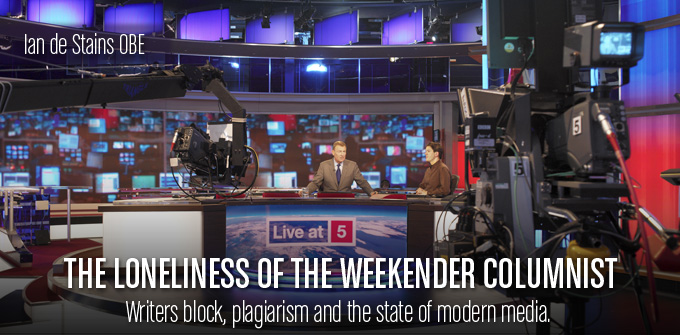From time to time I am fortunate enough to run into people who read this column. More often than not—and equally fortunately—they like what they read and have complimentary things to say about it. Now and again, a “well-wisher” will offer a suggestion: you should write about this; you ought to expose that; I’m surprised you haven’t already tackled so-and-so.
The problem with this is simple: those who offer the advice are not writers. If they were, they’d be using the ideas themselves.
Since they’re not, they don’t understand how a writer must approach an idea and how, sometimes, subjects that appear at first sight interesting, on close examination prove to be either insubstantial or completely inaccessible. It is frustrating, to say the least; just like the writer’s block that plagues us all from time to time.
You face an empty screen, an accusatory blinking cursor begging you to begin, to write the opening sentence and, try as you may, the brain refuses to cooperate.
Which is why writers who ought to know better sometimes make stories up or plagiarize what others have written. In 2003, a star New York Times writer, Jayson Blair was exposed for just such practices and currently in the UK, Johann Hari, formerly of The Independent is under public scrutiny for similar offenses and for “malicious Wikipedia editing.”
“24-7 rolling news cycles demand new headlines literally by the hour,
it is little wonder that some people begin to take liberties.”
There is no excuse, of course, for such behavior but in a world where the pressure is on to deliver 24-7 and where rolling news cycles demand new headlines literally by the hour, it is little wonder that some people begin to take liberties.
This is the same pressure that drove employees of Rupert Murdoch’s News Corporation allegedly to hack into the private emails and voice messages of celebrities, members of the British Royal Family and innocent victims of crime.
It is all too easy to point the finger of blame, but the fact remains we get the media we deserve.
If tabloids with lurid (and ludicrous) headlines (“alien lesbians abducted my grand-daughter”) outsell the broadsheets by multiples, we know there is something seriously wrong with our society.
Television, too: Fox, a prime example and interestingly another Murdoch News Corporation entity, enjoys worryingly healthy ratings despite the apparent, shall we say leniency, in its editorial approach.
CNN’s irritating—and frankly meaningless—motto of “going beyond borders” can’t make up for the paucity of its presenters’ abilities and I am afraid that even the BBC falls at the fence: these days it is more important to be young, female and preferably from an ethnic minority than it is to be able to communicate clearly and unambiguously.
Ian de Stains OBE is the author of “The Business Travellers’ Handbook to Japan” published by Stacey International in the UK and available from Amazon.
Image: Creative Commons









